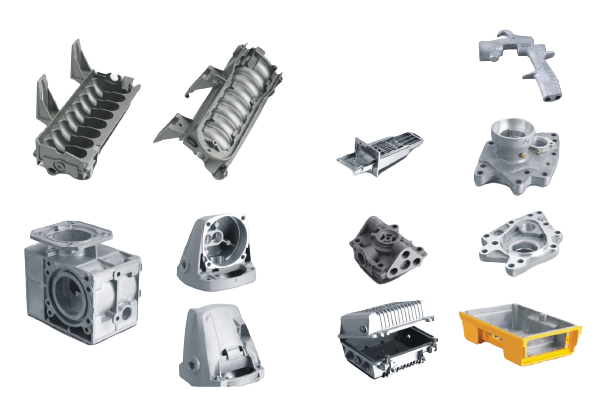Some Known Questions About Alcast Company.
Some Known Questions About Alcast Company.
Blog Article
The Only Guide for Alcast Company
Table of ContentsSome Ideas on Alcast Company You Need To KnowThe Basic Principles Of Alcast Company Facts About Alcast Company RevealedThe 2-Minute Rule for Alcast CompanySome Known Questions About Alcast Company.Alcast Company - The Facts
The refined distinction depends on the chemical content. Chemical Comparison of Cast Light weight aluminum Alloys Silicon promotes castability by reducing the alloy's melting temperature level and boosting fluidness throughout casting. It plays an essential duty in permitting detailed molds to be filled up accurately. Additionally, silicon adds to the alloy's toughness and use resistance, making it beneficial in applications where toughness is essential, such as automobile components and engine elements.It also boosts the machinability of the alloy, making it easier to process into ended up products. In this means, iron adds to the total workability of aluminum alloys.
Manganese adds to the strength of light weight aluminum alloys and enhances workability (aluminum casting manufacturer). It is generally used in wrought aluminum products like sheets, extrusions, and profiles. The existence of manganese help in the alloy's formability and resistance to cracking throughout manufacture processes. Magnesium is a light-weight element that offers toughness and influence resistance to light weight aluminum alloys.
The smart Trick of Alcast Company That Nobody is Talking About
It enables the manufacturing of light-weight components with superb mechanical residential properties. Zinc enhances the castability of light weight aluminum alloys and aids regulate the solidification procedure throughout spreading. It boosts the alloy's toughness and solidity. It is often found in applications where intricate forms and great information are needed, such as decorative castings and particular auto components.

The main thermal conductivity, tensile strength, yield toughness, and prolongation differ. Amongst the above alloys, A356 has the greatest thermal conductivity, and A380 and ADC12 have the least expensive.
Alcast Company Things To Know Before You Get This

In accuracy spreading, 6063 is appropriate for applications where elaborate geometries and top notch surface finishes are critical. Instances consist of telecommunication units, where the alloy's remarkable formability enables for sleek and aesthetically pleasing designs while keeping architectural stability. In the Lighting Solutions sector, precision-cast 6063 parts develop sophisticated and effective lights fixtures that require detailed forms and excellent thermal efficiency.
It causes a finer surface area finish and better deterioration resistance in A360. The A360 exhibits remarkable elongation, making it suitable for complex and thin-walled parts. In precision spreading applications, A360 is fit for markets such as Customer Electronics, Telecommunication, and Power Devices. Its enhanced fluidness permits intricate, high-precision parts like mobile phone casings and communication device housings.
The 5-Minute Rule for Alcast Company
Its distinct buildings make A360 a beneficial selection for accuracy spreading in these markets, improving product sturdiness and top quality. Light weight aluminum alloy 380, or A380, is a Check Out Your URL commonly used casting alloy with several distinct features. It supplies excellent castability, making it a perfect choice for accuracy spreading. A380 exhibits excellent fluidness when molten, guaranteeing elaborate and detailed mold and mildews are accurately reproduced.
In accuracy casting, light weight aluminum 413 radiates in the Customer Electronic Devices and Power Tools industries. This alloy's remarkable deterioration resistance makes it an excellent choice for outside applications, making sure durable, sturdy products in the mentioned industries.
Not known Incorrect Statements About Alcast Company
Once you have chosen that the aluminum die casting process is suitable for your project, an important next step is choosing the most suitable alloy. The aluminum alloy you select will considerably influence both the spreading process and the residential properties of the final product. Due to this, you have to make your choice thoroughly and take an informed strategy.
Identifying one of the most appropriate light weight aluminum alloy for your application will suggest evaluating a vast range of characteristics. These relative alloy characteristics comply with the North American Die Casting Organization's guidelines, and we have actually split them right into 2 classifications. The first group addresses alloy qualities that influence the manufacturing process. The 2nd covers characteristics impacting the residential properties of the final product.
The Main Principles Of Alcast Company
The alloy you pick for die spreading straight influences numerous facets of the spreading procedure, like just how very easy the alloy is to function with and if it is vulnerable to casting issues. Warm breaking, likewise called solidification breaking, is a normal die casting defect for aluminum alloys that can result in internal or surface-level rips or splits.
Certain light weight aluminum alloys are much more susceptible to warm splitting than others, and your selection needs to consider this. It can damage both the actors and the die, so you must look for alloys with high anti-soldering residential properties.
Corrosion resistance, which is currently a significant characteristic of light weight aluminum, can vary considerably from alloy to alloy and is an essential particular to think about relying on the environmental problems your product will certainly be exposed to (Aluminum Castings). Wear resistance is an additional building typically looked for in aluminum items and can distinguish some alloys
Report this page